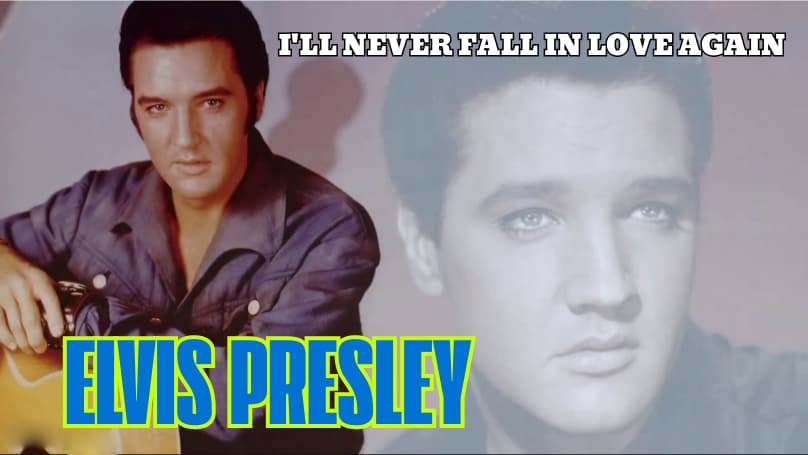
“I’ll Never Fall in Love Again”: A Timeless Lament of Heartbreak and Resilience
Ah, where does one even begin when speaking of Elvis Presley? The name itself conjures images of a bygone era, a time of unbridled youth, dazzling charisma, and a voice that could make angels weep or sinners dance. And among his vast catalog, there are those songs that, even decades later, resonate with an emotional depth that catches you unawares, pulling you back to simpler, perhaps more heartbroken, times. One such gem, often overlooked in the shadow of his colossal hits, is Elvis Presley‘s poignant rendition of “I’ll Never Fall in Love Again.”
While the song itself was originally penned by Lonnie Donegan and Jimmy Currie and first released by Donegan in 1962, it found its most commercially successful stride with Tom Jones in 1967. Jones’s version climbed to No. 2 on the UK Singles Chart and, upon a 1969 reissue in the US, reached No. 6 on the Hot 100 and No. 1 on the Adult Contemporary chart. Yet, it’s Elvis Presley‘s interpretation, recorded much later in February 1976 and released on his album From Elvis Presley Boulevard, Memphis, Tennessee in May 1976, that carries a particular weight, a profound, almost prophetic sadness that speaks volumes. It didn’t chart as a single for Elvis in the same way it did for Jones, but its place within his discography is undeniably significant.
The story behind Elvis‘s recording of “I’ll Never Fall in Love Again” is entwined with the twilight years of his life, specifically the intimate “Jungle Room” sessions at Graceland in February and October of 1976. RCA brought mobile recording equipment right into his home, creating an atmosphere that was both personal and, in hindsight, tragically poignant. These sessions, from which this song and others like “Moody Blue” and “Hurt” emerged, captured a more vulnerable, raw Elvis. He wasn’t in a pristine studio; he was in his personal space, perhaps grappling with the very emotions the song articulates. It was a time of personal turmoil for him, with relationships fraying and the pressures of his career weighing heavily.
The meaning of “I’ll Never Fall in Love Again” is as universal as heartbreak itself. It’s a lament, a weary sigh from a soul that has given freely, been bruised repeatedly, and now, in a moment of profound pain, vows to erect walls around its fragile heart. “I’ve been in love so many times, I thought I knew the score. Now you’ve treated me so wrong, I can’t take any more. And it looks like I’m never gonna fall in love again.” These lines, delivered by Elvis with a resonance that transcends mere performance, speak to anyone who has loved deeply and been betrayed. It’s a declaration born of self-preservation, a desperate plea to avoid future anguish. Yet, beneath the words, there’s often a faint flicker of hope, a human yearning that defies even the most resolute promises. For older listeners, particularly, this song taps into a wellspring of shared experience – the trials and tribulations of love, the memories of youthful exuberance turning into the quiet wisdom of heartache. It’s a song that acknowledges the scars we carry, but also the resilience it takes to keep going, even if we tell ourselves we’ll never risk our hearts again. In Elvis‘s voice, there’s a world-weariness that makes this particular rendition a profound reflection on the enduring fragility of the human heart, forever susceptible to love’s cruel whims.